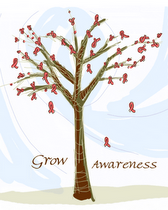When Maya had her 1st surgery it happened to be during one of the biggest Fundraiser of the year for Phoenix Children's Hospital. It involved KTAR a local radio station that hosted a 2 day telethon. I was taking Maya for a little stroll around the hospital and was approached by a PR person from Phoenix Childrens'. She asked me all about Maya. After meeting this person I was then asked to do a radio interview http://cluffcrew.blogspot.com/2011_09_01_archive.html and share my experience with how Phoenix Children's Hospital has helped Maya.
About 8 weeks later Maya was asked to return to the Hospital to do a photo shoot. We were able to share her story with sponsors and thank those who have donated to the hospital. These donations help make it possible for children like Maya to have such great care here at Phoenix Children's ~
For February Maya was chosen to do the Thank You card Promo. I believe their is more to come of her. The photographer took pictures of her for almost an hour. With here personality... she did every pose they asked here to do.
And can you believe this was 8 weeks post op? Here hip was broken-reattached-and a plate was placed to hold it together! I will post more pictures as the PR department continues to send them.!
Maya will have another surgery in March on her right hip. But I'm very hopeful she will do great!
Love You Maya! And so does everyone else!




